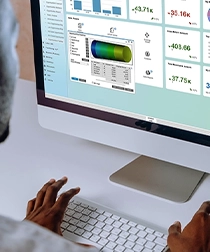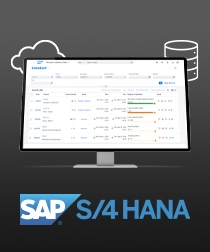Which ERP for an SME ? How to choose your ERP ?
What is an ERP ?
An ERP is a powerful software tool designed to help companies manage their resources, processes and data in an integrated way, contributing to better decision-making and more efficient management of business activities.
How to choose an ERP ?
1. Understand your SME’s needs
Before you start researching ERP options, it’s essential to understand the specific needs of your SME. Take the time to analyze your current business processes, from procurement and sales to inventory management and accounting. Identify areas where you face challenges or inefficiencies, and consider how an ERP could solve them.
2. Adapted to your SME’s size
Scalability is a crucial factor when choosing an ERP. Make sure the solution you’re considering can grow with your SME. An ERP that’s perfectly suited to your current size may not be sufficient as your business grows. Opt for a flexible solution that can be adapted to your future needs.
3. Key ERP features
Different SMEs have different needs, so it’s important to choose an ERP that offers the functionality that best suits your industry and operations. This can include inventory management, accounting, supply chain management, human resources management, and much more. Identify the functionality that’s essential to your business, and make sure it’s covered by the ERP you’re considering.
4. Integration
Your ERP shouldn’t be an isolated software. It must be able to integrate easily with other systems your SME already uses, such as CRM software, e-commerce platforms and project management tools. Interoperability is essential to ensure the smooth flow of data throughout your enterprise.
5. User-friendliness and training
User-friendliness is a key factor in the successful adoption of ERP in your SME. Make sure that the ERP user interface is intuitive, and that your team can easily learn to use it. Some solutions also offer training to help your team master the tool quickly.
6. Costs and Return on Investment (ROI)
When it comes to costs, it’s important to consider not only the initial price of the ERP, but also the costs of implementation, customization and ongoing maintenance. Calculate the potential return on investment based on the efficiencies and savings that ERP can bring to your SME.
Choosing the right ERP for your SME can be a complex task, but with a thorough understanding of your needs, careful research and careful evaluation of the options available, you can make an informed decision.
So here’s the guide with important questions to consider when selecting an ERP:
- What are my company’s specific needs?
- Is the ERP adapted to the size and scale of my company?
- Is the ERP adapted to my business sector?
- Is the ERP scalable and customizable?
- Does ERP integrate with existing systems?
- What is the total cost of ownership?
- What is the ERP user experience?
- What support and training services are offered?
- What are the implementation timescales?
By asking these questions and taking the time to evaluate your options, you’ll be able to choose an ERP that best meets your company’s needs and contributes to its long-term success.




